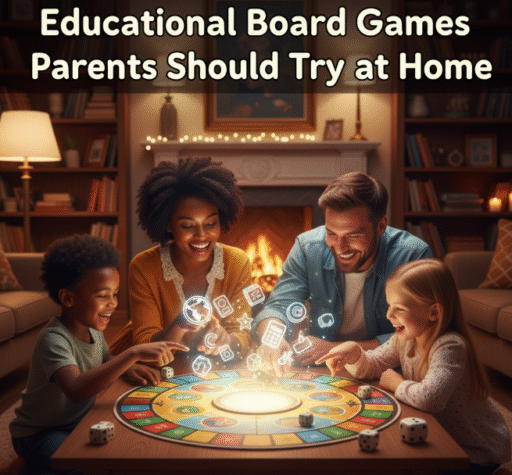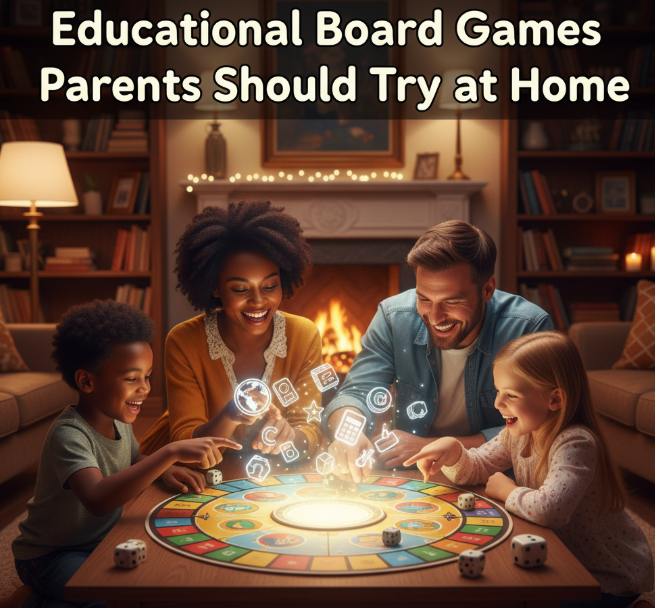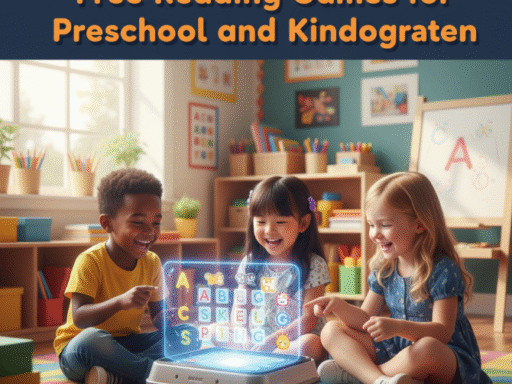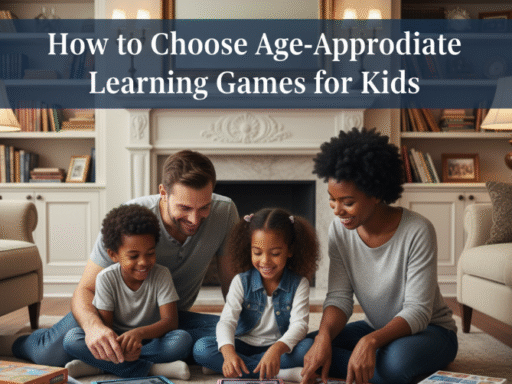Introduction
In today’s fast-paced world, where screens often take the spotlight, many parents are searching for fun yet meaningful ways to connect with their children at home. One timeless solution lies in educational board games. These games not only spark joy and laughter but also build critical skills like problem-solving, creativity, logic, vocabulary, and teamwork.
Board games bring families together around the table, offering learning disguised as play. Whether your child is in elementary school, middle school, or even high school, there’s a game that can enhance their education while keeping them entertained.
In this article, we’ll explore the best educational board games parents should try at home, categorized by subject areas such as math, language, science, and strategy. We’ll also highlight the benefits of board games for learning, give you tips for choosing the right ones, and share a quick comparison table to make your decision easier.
Why Parents Should Choose Educational Board Games
Educational board games offer far more than just entertainment. Let’s look at the core reasons parents should integrate them into family time:
-
Strengthens Bonds – Family board game nights create memories and improve parent-child relationships.
-
Improves Focus & Patience – Kids learn to wait for turns and follow rules.
-
Encourages Problem-Solving – Many games require planning, logical thinking, and decision-making.
-
Supports Academic Learning – Games can reinforce school subjects like math, reading, history, or geography.
-
Boosts Communication Skills – Kids learn to express ideas, negotiate, and even argue respectfully.
-
Reduces Screen Time – A fun, healthy alternative to gadgets.
Categories of Educational Board Games
To make your choice easier, here’s a breakdown of the best games by subject area.
1. Math-Based Board Games
If your child struggles with numbers, math games can turn practice into play.
Top Picks:
-
Sum Swamp – Designed for younger children, this game uses dice rolls to practice basic addition and subtraction.
-
Prime Climb – A colorful game for older kids that teaches multiplication, division, and prime numbers.
-
Monopoly (Educational Twist) – Beyond money management, it builds skills in addition, subtraction, and probability.
Skills Learned:
-
Arithmetic
-
Logical reasoning
-
Money management
2. Word and Vocabulary Games
Building a strong vocabulary is essential, and word games make it exciting.
Top Picks:
-
Scrabble – A timeless classic where players build words for points.
-
Bananagrams – Fast-paced word-building game, perfect for quick sessions.
-
Codenames – Encourages critical thinking and word association skills.
Skills Learned:
-
Spelling
-
Vocabulary
-
Creative word formation
-
Strategic thinking
3. Science and Discovery Games
Curious kids love exploring science, nature, and experiments.
Top Picks:
-
Cytosis: A Cell Biology Game – A unique game set inside a human cell, great for older children.
-
Photosynthesis – Teaches ecology and environmental science concepts through tree-growing strategies.
-
Wildcraft! – Introduces herbal knowledge and teamwork in an adventure-style format.
Skills Learned:
-
Biology basics
-
Environmental awareness
-
Scientific reasoning
4. History and Geography Games
Perfect for children who want to explore the world or understand the past.
Top Picks:
-
Ticket to Ride – Teaches geography through railway routes across maps.
-
Timeline – Players place events in chronological order, making history memorable.
-
Where in the World? – Enhances knowledge of countries, capitals, and landmarks.
Skills Learned:
-
Geography knowledge
-
Historical sequencing
-
Cultural awareness
5. Strategy and Critical Thinking Games
These games challenge children to think ahead, plan moves, and analyze opponents.
Top Picks:
-
Chess – Classic strategy that sharpens logic, patience, and foresight.
-
Settlers of Catan – Focuses on resource management and negotiation.
-
Blokus – A simple yet brilliant strategy game using shapes and patterns.
Skills Learned:
-
Planning ahead
-
Analytical skills
-
Negotiation & trade strategies
6. Creativity and Imagination Games
Some board games encourage children to dream big and unleash imagination.
Top Picks:
-
Dixit – Uses beautiful illustrations to spark storytelling.
-
Pictionary – A fun way to combine drawing with guessing.
-
Rory’s Story Cubes – Promotes storytelling with picture dice.
Skills Learned:
-
Creativity
-
Storytelling
-
Lateral thinking
Quick Comparison Table of Educational Board Games
Here’s a handy comparison chart to help you choose the right board game based on learning focus:
| Game | Category | Age Group | Skills Developed | Family Fun Level ⭐ |
|---|---|---|---|---|
| Sum Swamp | Math | 5–8 | Addition, subtraction | ⭐⭐⭐⭐ |
| Prime Climb | Math | 8+ | Multiplication, division, primes | ⭐⭐⭐⭐ |
| Scrabble | Vocabulary | 8+ | Spelling, word formation | ⭐⭐⭐⭐⭐ |
| Codenames | Vocabulary | 10+ | Word association, teamwork | ⭐⭐⭐⭐ |
| Photosynthesis | Science | 8+ | Ecology, environment | ⭐⭐⭐⭐⭐ |
| Cytosis | Science | 10+ | Biology, logical planning | ⭐⭐⭐⭐ |
| Ticket to Ride | Geography | 8+ | Maps, strategy | ⭐⭐⭐⭐⭐ |
| Timeline | History | 8+ | Chronology, memory | ⭐⭐⭐⭐ |
| Chess | Strategy | 6+ | Planning, logic | ⭐⭐⭐⭐⭐ |
| Dixit | Creativity | 8+ | Storytelling, imagination | ⭐⭐⭐⭐ |
Tips for Parents to Make Board Game Nights Successful
Playing board games at home can be magical if done right. Here are practical tips for parents:
-
Pick Games by Age Level – A complex game may overwhelm younger children.
-
Mix Fun with Learning – Choose games that balance entertainment with education.
-
Be Patient – Kids might take time to understand rules; guide them gently.
-
Rotate Games – Keep variety to prevent boredom.
-
Include the Whole Family – Siblings, grandparents, and parents should join for more fun.
-
Set a Regular Game Night – Consistency helps children look forward to learning playtime.

Educational Board Games Parents Should Try at Home
Benefits of Educational Board Games Beyond School
Board games don’t just improve grades – they prepare kids for life.
-
Problem-Solving for Real Life – Learning how to plan and adapt helps in daily challenges.
-
Social Skills – Kids learn cooperation, patience, and negotiation.
-
Confidence Boost – Winning small challenges builds self-esteem.
-
Stress Relief – Games create laughter, helping children (and parents) relax.
FAQs About Educational Board Games
Q1: At what age should children start playing board games?
👉 Many games exist for kids as young as 3 years old, focusing on colors, shapes, and basic numbers.
Q2: Can board games replace school learning?
👉 No, but they complement classroom lessons by making subjects engaging.
Q3: How often should families play educational board games?
👉 Even 1–2 sessions a week can make a big difference in skill development.
Q4: What if my child prefers video games?
👉 Try hybrid learning games like digital versions of Scrabble or Ticket to Ride to make the transition easier.
Conclusion
Educational board games are more than toys—they are powerful learning tools disguised as fun. From math and vocabulary to science and strategy, these games sharpen essential life skills while bringing families closer together.
By choosing the right games, setting up family play sessions, and mixing learning with laughter, parents can transform ordinary evenings into extraordinary learning adventures.
So the next time you’re looking for a fun indoor activity, skip the screen and pull out a board game—you’ll be investing in your child’s growth while making priceless family memories.




